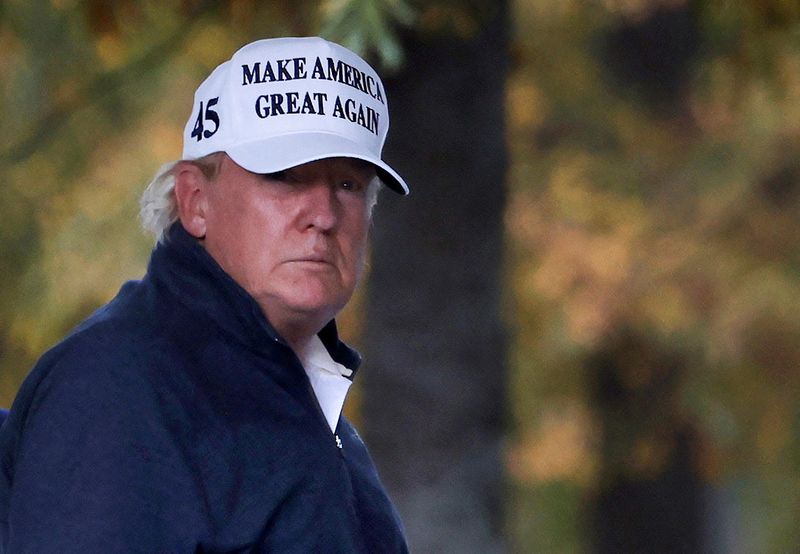Investing.com’s stocks of the week
By Tim Reid
(Reuters) - Donald Trump's indictment on Tuesday for his alleged role in efforts to overturn his 2020 election defeat will likely fuel his march toward the Republican Party's 2024 presidential nomination, analysts and party strategists say.
"This will rally his supporters to his talking points - about how the establishment and the 'deep state' are against him and against them," Stu Rothenberg, a non-partisan political analyst, said before the indictment was handed down.
Opinion polls show Republican support for Trump surging since the first of three indictments was issued in March. He is far and away the front-runner, leading second-place Ron DeSantis, Florida's governor, by close to 30 percentage points.
Trump, the former president, has made the indictments a central plank of his campaign platform, portraying himself as the target of a biased justice system, the first former president in U.S. history to face criminal charges.
Minutes before the indictment was announced, Trump called it "fake" on his Truth Social media platform.
A Trump campaign statement later said: "President Trump has always followed the law and the Constitution, with advice from many highly accomplished attorneys." The statement likened his indictments this year to "Nazi Germany in the 1930s."
The indictments are piling up - three so far this year. And so are the court dates.
His New York state criminal trial involving a hush money payment to a porn star is due to start on March 25, 2024, and his Florida trial in a federal classified documents case is scheduled to begin on May 20.
Both would take place just months before the November election. So might a third trial in this latest case centered on his failed bid to overturn his 2020 election defeat to Democrat Joe Biden. Trump must appear in court on Thursday in this case.
Strategists said that while the indictments could help Trump solidify support within his base and win the Republican nomination, his ability to capitalize on them may be more limited in next year's general election, when he will have to win over more skeptical moderate Republicans and independents.
In a July Reuters/Ipsos poll, 37% of independents said the criminal cases against Trump made them less likely to vote for him for president, compared to 8% who said they were more likely to do so.
Underscoring the potential closeness of the November 2024 general election, the latest Reuters/Ipsos poll shows Biden leading Trump 37% to 35% in a hypothetical match-up, with the remaining 28% saying they were not sure of their choice or whether they would vote for someone else or no one at all.
The strategists said Trump was likely to stick to his campaign playbook for now and use the latest indictment to reinforce his central argument that - despite being a former president - he is an outsider running to protect his supporters from a runaway Justice Department rigged against Republicans.
"They're not indicting me, they're indicting you. I just happen to be standing in their way," Trump declared at a campaign rally in Pennsylvania on July 29.
Trump's rivals for the nomination have so far largely stayed silent about his first two indictments, although that could change given this latest one alleges he sought to overturn an election in an assault on a bastion of American democracy.
"If the past pattern holds, with conservative media and Republicans sort of not going after Trump on it, this isn't going to make a significant difference with the Republican 2024 primary," said Chris Jackson, a public opinion researcher at polling firm Ipsos, which conducts polls for Reuters and other media organizations.
Shortly before the hush-money indictment in March, Trump's share of party support stood at 44%, 15 percentage points above his closest rival, Florida Governor Ron DeSantis, who had 29% support. After he was indicted in the hush money case, his support rose to 49%, while DeSantis slipped to 23%.
Since then that dynamic has held. A second batch of criminal charges in June accusing Trump of willful retention and improper sharing of national defense information had little lasting impact on Trump's polling numbers, Jackson said.
The relentless media focus on Trump and the indictments also drowns out his rivals as they seek a breakthrough moment in the Republican primary battle, a race Trump has dominated for months, said John Feehery, a Republican strategist.
"(DeSantis) is not going to be able to get a word in edgewise," Feehery said.
Like Jackson at Ipsos, Rothenberg predicts a close general election in November 2024, no matter who the Republicans nominate to face off against Biden, the likely Democratic opponent.
But if it is Trump, Rothenberg said he is in danger of losing enough independents and moderates to lose the election, in part because of the indictments.
"There can be a point at which various groups of people along the way say, 'I've just had it. I'm tired of this. I'm tired of this fighting. I'm tired of Donald Trump,'" Rothenberg said.
